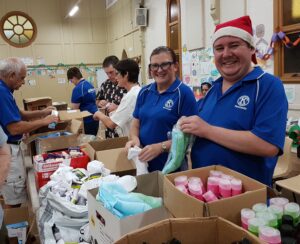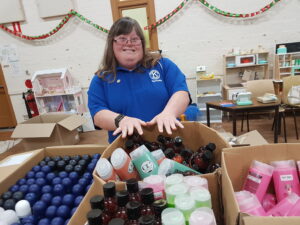 Place matters! Around the world, Aktion Clubs are hosted by facilities, agencies, nonprofits, businesses and governments. Each type of place has its own advantages and challenges, but host sites generally can provide:
Place matters! Around the world, Aktion Clubs are hosted by facilities, agencies, nonprofits, businesses and governments. Each type of place has its own advantages and challenges, but host sites generally can provide:
- A facility or staff advisor.
- A meeting place.
- Financial support.
- Supplies.
- Transportation.
Here are some examples of host organizations or arrangements that have proved to be a perfect fit for clubs:
- Day and residential facilities: These facilities can be nonprofits or businesses. For example, the Opportunity Tree, Phoenix and Avondale Aktion Clubs in Arizona, U.S., meet at the Opportunity Tree’s daytime facilities, which serve adults with disabilities. Among the programs Opportunity Tree offers are a day program with connection-building activities, trips, on-campus events and employment services. For Aktion Clubs, the facility’s built-in population makes recruiting members easier — and transportation is available for visits to places where members serve and engage the community. A full-time staff at each site makes finding a facility advisor easy, even when staff members leave their positions. And multiple locations mean the love of Aktion Club can spread across its network!
- Nonprofit organizations serving adults with disabilities: Shelbyville VC Aktion Club in Indiana, U.S., is hosted by two local nonprofits. The ARC of Shelby County gives club members access to expertise and resources, along with referrals for medical, educational and employment needs. The ARC does not have a meeting space, however, so the club meets at West Street United Methodist Church, which provides ample space for meetings. The church also holds service activities and events, and it brings in eager supporters for Aktion Club fundraisers — such as its calendar, candy, cookbook and Christmas ornament sales.
- Public agencies: From school districts to libraries and parks, government organizations offer host sites for Aktion Clubs. For 25 years, the Santa Maria Aktion Club in California, U.S., has been hosted by the Santa Maria Recreation and Parks Department, which gives the club access to meeting space, supply storage and a staff member who serves as facility advisor. The club draws members from across the city, and members range in age from 20 to 70. The club holds events like dances at no cost for space, and it even receives funding for its activities through the Parks Department’s therapeutic program. An added benefit: The club has access to city staff, including its graphic artist!
- Virtual club: Last year, Ohio-based nonprofit We Thrive Together (WTT) chartered Aktion Club’s first virtual club: the We Thrive Together Virtual Aktion Club. Members meet online once per month, making participation possible for people who have physical limitations and for others who have no access to an in-person club. WTT offers virtual programming, from self-advocacy training to virtual field trips. The club’s 130 members — who come from 13 U.S. states, Canada and Central America— conduct service activities in their local communities.
 Some Aktion Clubs even operate without a specific host site. Although not affiliated with a hosting facility or organization, some have an arrangement to meet in one or several places in their communities. One example is the Newcastle Aktion Club in New South Wales, Australia, sponsored by the Kiwanis Club of Newcastle. The club meets in a church hall at a local school, which is provided at no charge and offers ample space for meetings and combined service projects with the Kiwanis club. This location gives the Aktion Club a summer bonus — a bocce ball court next to the hall!
Some Aktion Clubs even operate without a specific host site. Although not affiliated with a hosting facility or organization, some have an arrangement to meet in one or several places in their communities. One example is the Newcastle Aktion Club in New South Wales, Australia, sponsored by the Kiwanis Club of Newcastle. The club meets in a church hall at a local school, which is provided at no charge and offers ample space for meetings and combined service projects with the Kiwanis club. This location gives the Aktion Club a summer bonus — a bocce ball court next to the hall!
